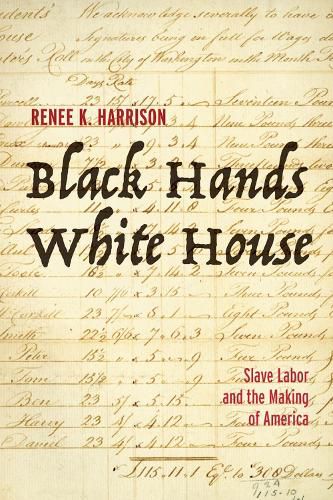Readings Newsletter
Become a Readings Member to make your shopping experience even easier.
Sign in or sign up for free!
You’re not far away from qualifying for FREE standard shipping within Australia
You’ve qualified for FREE standard shipping within Australia
The cart is loading…






Black Hands, White House documents and appraises the role enslaved women and men played in building the US, both its physical and its fiscal infrastructure. The book highlights the material commodities produced by enslaved communities during the Transatlantic Slave Trade. These commodities–namely tobacco, rice, sugar, and cotton, among others–enriched European and US economies; contributed to the material and monetary wealth of the nation’s founding fathers, other early European immigrants, and their descendants; and bolstered the wealth of present-day companies founded during the American slave era. Critical to this study are also examples of enslaved laborers’ role in building Thomas Jefferson’s Monticello and George Washington’s Mount Vernon. Subsequently, their labor also constructed the nation’s capital city, Federal City (later renamed Washington, DC), its seats of governance–the White House and US Capitol–and other federal sites and memorials.
Given the enslaved community’s contribution to the US, this work questions the absence of memorials on the National Mall that honor enslaved, Black-bodied people. Harrison argues that such monuments are necessary to redress the nation’s historical disregard of Black people and America’s role in their forced migration, violent subjugation, and free labor. The erection of monuments commissioned by the US government would publicly demonstrate the government’s admission of the US’s historical role in slavery and human-harm, and acknowledgment of the karmic debt owed to these first Black-bodied builders of America.
Black Hands, White House appeals to those interested in exploring how nation-building and selective memory, American patriotism and hypocrisy, racial superiority and mythmaking are embedded in US origins and monuments, as well as in other memorials throughout the transatlantic European world. Such a study is necessary, as it adds significantly to the burgeoning and in-depth conversation on racial disparity, race relations, history-making, reparations, and monument erection and removal.
$9.00 standard shipping within Australia
FREE standard shipping within Australia for orders over $100.00
Express & International shipping calculated at checkout
Black Hands, White House documents and appraises the role enslaved women and men played in building the US, both its physical and its fiscal infrastructure. The book highlights the material commodities produced by enslaved communities during the Transatlantic Slave Trade. These commodities–namely tobacco, rice, sugar, and cotton, among others–enriched European and US economies; contributed to the material and monetary wealth of the nation’s founding fathers, other early European immigrants, and their descendants; and bolstered the wealth of present-day companies founded during the American slave era. Critical to this study are also examples of enslaved laborers’ role in building Thomas Jefferson’s Monticello and George Washington’s Mount Vernon. Subsequently, their labor also constructed the nation’s capital city, Federal City (later renamed Washington, DC), its seats of governance–the White House and US Capitol–and other federal sites and memorials.
Given the enslaved community’s contribution to the US, this work questions the absence of memorials on the National Mall that honor enslaved, Black-bodied people. Harrison argues that such monuments are necessary to redress the nation’s historical disregard of Black people and America’s role in their forced migration, violent subjugation, and free labor. The erection of monuments commissioned by the US government would publicly demonstrate the government’s admission of the US’s historical role in slavery and human-harm, and acknowledgment of the karmic debt owed to these first Black-bodied builders of America.
Black Hands, White House appeals to those interested in exploring how nation-building and selective memory, American patriotism and hypocrisy, racial superiority and mythmaking are embedded in US origins and monuments, as well as in other memorials throughout the transatlantic European world. Such a study is necessary, as it adds significantly to the burgeoning and in-depth conversation on racial disparity, race relations, history-making, reparations, and monument erection and removal.